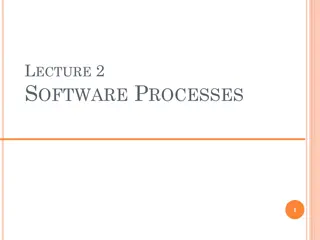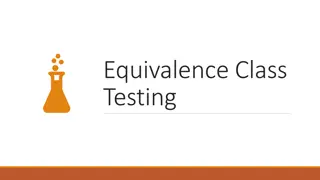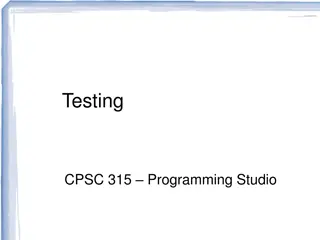Software Testing Course in Noida
Our Software Testing Course in Noida is meticulously designed to cover the latest industry trends and practices. You'll gain hands-on experience with various testing tools and methodologies, including Manual Testing, Automation Testing, Selenium, and
Download Presentation

Please find below an Image/Link to download the presentation.
The content on the website is provided AS IS for your information and personal use only. It may not be sold, licensed, or shared on other websites without obtaining consent from the author.If you encounter any issues during the download, it is possible that the publisher has removed the file from their server.
You are allowed to download the files provided on this website for personal or commercial use, subject to the condition that they are used lawfully. All files are the property of their respective owners.
The content on the website is provided AS IS for your information and personal use only. It may not be sold, licensed, or shared on other websites without obtaining consent from the author.
E N D
Presentation Transcript
Software Testing Course in Noida APTRON Solutions
Introduction to Software Testing In the dynamic and fast-paced world of software development, ensuring that applications perform flawlessly and meet user expectations is paramount. This is where Software Testing comes into play. Software Testing Course in Noida is a systematic process that involves evaluating and verifying that a software application or system functions as intended. By identifying defects, bugs, and discrepancies, software testing ensures the delivery of a high-quality product that meets specified requirements and standards. The primary goal of software testing is to detect any issues early in the development lifecycle, thereby preventing costly fixes and enhancing the overall quality of the software. Through various testing methodologies and techniques, software testers meticulously examine every aspect of the application, from its functionality and performance to its security and usability. This comprehensive approach helps in validating that the software not only meets the technical requirements but also delivers a seamless user experience.
Understanding Software Testing Software Testing is a critical process in the software development lifecycle aimed at evaluating and verifying that a software application or system performs as expected. The primary goals of software testing are to identify defects, ensure the software meets specified requirements, and enhance the overall quality of the product. Key Objectives of Software Testing Detecting Defects: The primary objective is to identify any defects or bugs in the software that could cause it to function incorrectly or unexpectedly. Ensuring Quality: Testing helps in ensuring that the software meets the desired quality standards and performs reliably under various conditions. Validation and Verification: It involves verifying that the software meets the requirements and specifications and validating that it fulfills the intended purpose and user needs. Performance Evaluation: Testing assesses the performance of the software in terms of responsiveness, speed, and stability under different workloads and conditions. Security Assurance: Ensuring that the software is secure from vulnerabilities and threats, protecting user data and system integrity. 1. 2. 3. 4. 5.
Types of Software Testing Manual Testing: This involves manually executing test cases without the use of automation tools. Testers play the role of end-users and interact with the software to identify defects. Exploratory Testing: Testers explore the application without predefined test cases to discover defects. Usability Testing: Focuses on the user experience and interface, ensuring the software is easy to use. Automation Testing: Uses automated tools to execute test cases, making the testing process faster and more efficient. Regression Testing: Ensures that new code changes do not adversely affect existing functionality. Performance Testing: Includes load testing, stress testing, and endurance testing to evaluate the software's performance under various conditions. Functional Testing: Validates that each function of the software application operates in conformance with the requirement specification. Unit Testing: Tests individual components or modules of the software. Integration Testing: Tests the interaction between integrated modules to ensure they work together correctly.
Non-Functional Testing: Evaluates non-functional aspects such as performance, usability, reliability, and security. Load Testing: Assesses the software s performance under expected load conditions. Security Testing: Identifies vulnerabilities and ensures the software is secure from threats. Acceptance Testing: Determines whether the software is ready for delivery. It is often performed by the end-users. Alpha Testing: Conducted by developers or internal testers before releasing the product to real users. Beta Testing: Performed by actual users in a real environment to gather feedback before the final release.
Importance of Software Testing Quality Assurance: Ensures the delivery of a high-quality product that meets user expectations and requirements. Cost-Effectiveness: Detecting and fixing defects early in the development process is less expensive than dealing with issues after the product has been released. User Satisfaction: A thoroughly tested product enhances user satisfaction and trust, leading to higher user retention and positive reviews. Risk Mitigation: Identifies potential risks and issues before the software is deployed, reducing the chances of failure in a live environment. Compliance: Ensures that the software adheres to industry standards, regulations, and guidelines.
Why Choose APTRON Solutions for Software Testing Training? Expert Instructors: Our course is led by industry veterans with years of experience in software testing. They bring real-world insights and practical knowledge to the classroom, ensuring you gain a deep understanding of software testing principles and practices. Comprehensive Curriculum: The course covers all essential aspects of software testing, including manual testing, automation testing, performance testing, and more. You ll learn to use popular testing tools like Selenium, QTP, LoadRunner, and JMeter. Hands-On Training: At APTRON Solutions, we believe in learning by doing. Our course includes numerous hands-on projects and practical exercises to help you apply what you've learned in real-world scenarios. Flexible Learning Options: We offer both classroom and online training options to suit your schedule and learning preferences. Whether you prefer in-person instruction or the convenience of online learning, we have you covered. Placement Assistance: Our dedicated placement cell works tirelessly to connect you with top employers in the software testing industry. We provide resume-building workshops, interview preparation sessions, and job placement support to help you land your dream job.
Course Highlights Manual Testing: Understand the fundamentals of manual testing, test case creation, test execution, and defect reporting. Automation Testing: Learn to automate test cases using tools like Selenium and QTP. Performance Testing: Gain insights into performance testing using LoadRunner and JMeter. Mobile Testing: Explore the techniques and tools for testing mobile applications. Real-World Projects: Work on real-world projects to gain practical experience and build a strong portfolio.
Contact Detail Address : B-10, SECTOR-2 NEAR SECTOR - 15 METRO STATION NOIDA - 201301, U.P. (INDIA) Mobile: 706-527-3000 Gmail: info@aptronsolutions.com Website: https://aptronsolutions.com/























